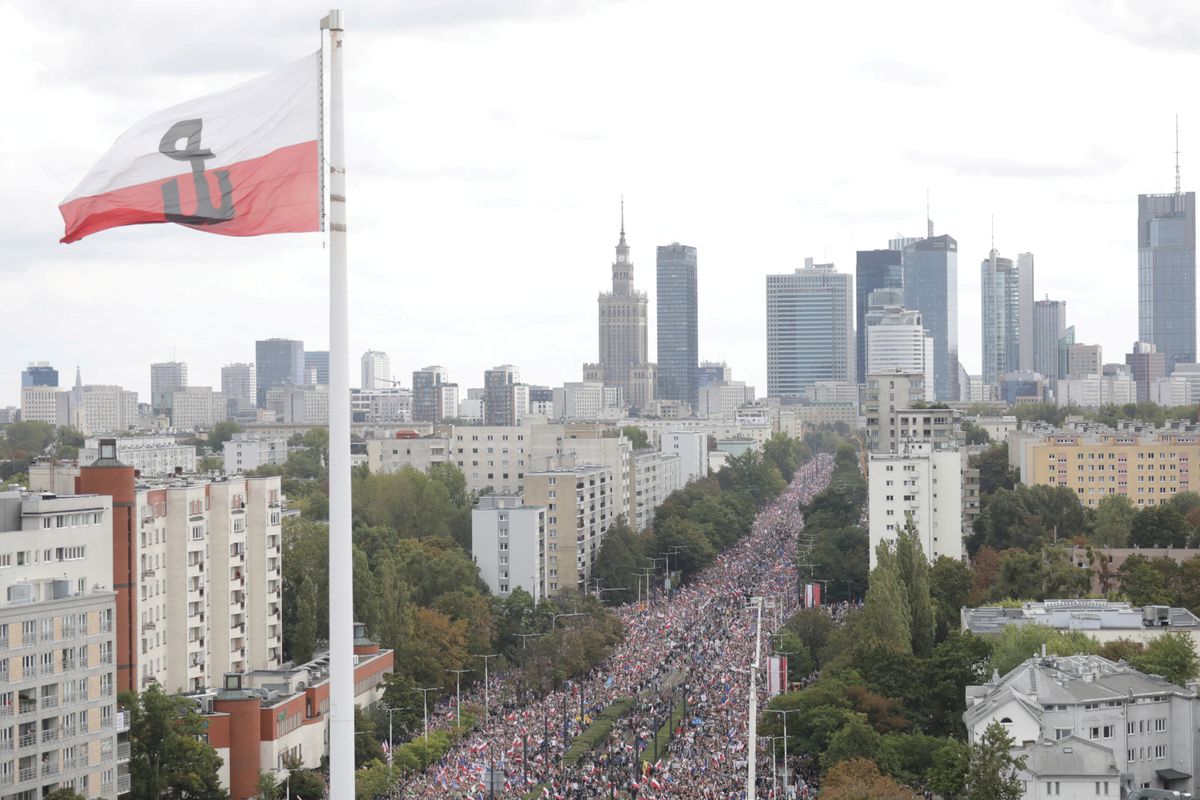In less than two weeks, Poland’s United Right alliance will face the biggest challenge to its grip on power since gaining control of parliament in 2015. The national-conservative party’s strident rhetoric and generous welfare policies have lost some of their appeal, but voters don’t appear ready to decisively embrace the alternative path offered by the liberal opposition either. Among other uncertainties, it’s unclear how the tricky politics of the war next door in Ukraine will play out when polls open on Oct. 15.
Months of difficult government-formation talks and maybe even new elections could follow. We sat down with Eurasia Group expert Anna-Carina Hamker to talk about what to expect.
Why have voters soured on the United Right?
The alliance has been losing support since a constitutional court packed with its appointees instituted an abortion ban in 2020. An overall sense of fatigue with the government and a lack of new (young) faces is another factor that has contributed to its gradual decline.
Over the past 12 months, a deteriorating economic situation has also contributed. The well-targeted social benefits that the United Right has used to shore up its support in the past – such as the 500 zloty per child payments to families the government has promised to expand – have become less effective in a context of high inflation.
Despite these developments, the United Right maintains a strong base of mainly rural voters (more than 30% of the electorate) and will likely win the largest vote share in the elections.
What are the main issues for voters?
According to recent surveys, the main issues are inflation, access to and the quality of healthcare, security (particularly in light of the war raging in Ukraine), and the independence of the judiciary. Under the guise of fighting the remnants of communism, the government has adopted multiple laws bringing the judiciary under political control, causing a long-running confrontation with the EU.
Security has been a key topic in the United Right’s campaign, but recent surveys suggest that Poles trust the leading opposition party – the Civic Coalition – slightly more to keep them safe. This is likely the result of recent mishaps, such as a series of conflicting communications issued in response to an incursion into Polish airspace by Belarusian helicopters. De-politicizing the judiciary and the media is a key priority for the liberal opposition. On the economy, the far-right Confederation party has gained a lot of support with its proposals for radical tax and benefits cuts.
What role has Ukraine played?
A big one!
The United Right is at risk of losing some (potential) supporters to the far-right Confederation over the generous support offered to Ukraine, both in terms of military and humanitarian aid.
Polish farmers – a key United Right constituency – have suffered from falling grain prices they attribute to the large amounts of Ukrainian grain exported to Poland and other EU countries. The Confederation party has wooed these farmers with its anti-Ukrainian rhetoric. Fearing a loss of support, the United Right enacted a unilateral grain import ban before the summer that provoked tensions with Brussels and Kyiv. The government fired back by announcing a reduction in financial support for Ukrainian refugees from next year.
What is the likelihood of a contested election? Difficult government formation process?
I think the election will likely produce a hung parliament – that is, no parliamentary majority for the United Right or the combined liberal opposition. In that case, Confederation will be the kingmaker. Both the United Right and the liberal opposition will probably try to enlist its support, either for a minority government or by convincing individual lawmakers to switch sides.
Though there is more ideological alignment between Confederation and the United Right, Confederation would be wary of being co-opted by the ruling alliance, which could prompt it to join forces with the liberal opposition instead.
In the event of a hung parliament, we expect a lengthy government formation process that could drag out into the new year. There is also a substantial risk that the parties fail to form a government, forcing snap elections early next year.
What would another United Right government mean?
This will depend on whether the United Right commands a parliamentary majority or relies on cooperation with Confederation. In the former case, I’d expect mostly continuity on foreign policy, but the rather aggressive rhetoric directed at Brussels would ebb a bit, as would the assertiveness toward Ukraine. Domestically, the ruling alliance would likely try to tighten its grip on power even more by undermining the powers of democratic institutions.
In the case of cooperation with Confederation, I think relations with the EU could get even worse. Both parties are critical of the European Commission’s powers, and, considering that they are competing for the same national-conservative electorate, there could be a battle between the two parties about who is best at protecting Polish sovereignty from Brussels’s influence. Warsaw’s growing assertiveness toward Kyiv would likely also remain a problem as the parties continue to compete.
What would a liberal opposition-led government mean?
Its immediate priorities would be to de-politicize democratic institutions, reform the judiciary, and improve relations with Brussels. It would likely also take significant steps to accelerate Poland’s green transition. However, considering that the ruling coalition would consist of at least three parties, I think that once immediate priorities have been addressed, there will be a lot of potential for tensions and, thus, slow policy progress and maybe even the government’s collapse. We have seen these problems in other European countries with three-party governments, such as Germany.
Edited by Jonathan House, senior editor at Eurasia Group.






